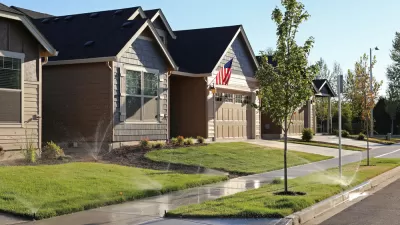As institutional investors buy up a larger share of single-family homes, the families renting them are increasingly vulnerable to rent increases and eviction.

“Families desperately trying to buy houses are losing out to institutional investors who can out-bid them, offer all-cash deals, and waive mortgage and inspection contingencies,” writes Suzanne Lanyi Charles in an opinion piece for The Hill. “While we must attend to [institutional investors’] stifling effect on homeownership, we must also take this moment to protect the growing contingent of renters from mega-landlords’ egregious practices.”
“Historically, single-family rentals were the domain of small-scale mom-and-pop landlords who owned and operated a few properties. But in the wake of the 2008 housing crisis, as foreclosures spiked and house prices fell, investors seized an opportunity” to buy foreclosed properties in bulk. “Today, four mega-landlords —Invitation Homes, Progress Residential, American Homes 4 Rent, and Tricon Residential—own more than 225,000 single-family houses in the U.S.”
According to Charles, “In my research, I find that mega-landlords own up to 35 percent of the single-family homes in Atlanta-area neighborhoods. And where their rentals are highly concentrated, mega-landlords have outsized power over the lives of residents.”
Charles outlines three potential solutions:
- “Disclosure is the first step so that municipalities and residents alike can understand the magnitude of mega-landlords’ presence in their neighborhoods.”
- “Second, we should institute ‘good cause’ eviction protections for families who rent their homes from mega-landlords.”
- “Lastly, to counter the market power that mega-landlords have to increase rents exorbitantly, we should limit the amount that mega-landlords can raise rents.”
FULL STORY: Renters are the overlooked victims of big investors

Trump Administration Could Effectively End Housing Voucher Program
Federal officials are eyeing major cuts to the Section 8 program that helps millions of low-income households pay rent.

Planetizen Federal Action Tracker
A weekly monitor of how Trump’s orders and actions are impacting planners and planning in America.

The 120 Year Old Tiny Home Villages That Sheltered San Francisco’s Earthquake Refugees
More than a century ago, San Francisco mobilized to house thousands of residents displaced by the 1906 earthquake. Could their strategy offer a model for the present?

Alabama School Forestry Initiative Brings Trees to Schoolyards
Trees can improve physical and mental health for students and commnity members.

NYC Outdoor Dining Could Get a Re-Do
The city council is considering making the al fresco dining program year-round to address cost concerns from small businesses.

HSR Reaches Key Settlement in Northern California City
The state’s high-speed rail authority reached an agreement with Millbrae, a key city on the train’s proposed route to San Francisco.
Urban Design for Planners 1: Software Tools
This six-course series explores essential urban design concepts using open source software and equips planners with the tools they need to participate fully in the urban design process.
Planning for Universal Design
Learn the tools for implementing Universal Design in planning regulations.
Ada County Highway District
Clanton & Associates, Inc.
Jessamine County Fiscal Court
Institute for Housing and Urban Development Studies (IHS)
City of Grandview
Harvard GSD Executive Education
Toledo-Lucas County Plan Commissions
Salt Lake City
NYU Wagner Graduate School of Public Service





























